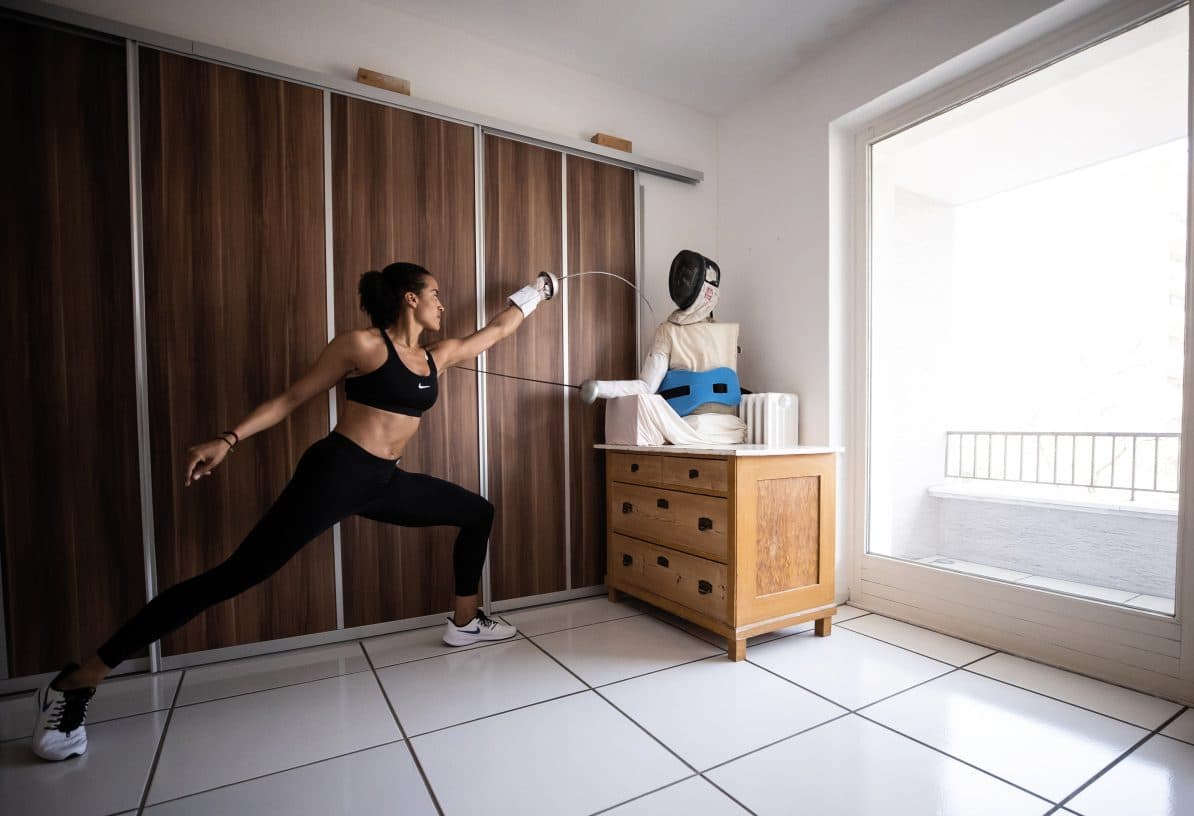The home games: 6. Alexandra Ndolo
In May the International Olympic Committee warned that hosting the Games in 2021 would be challenging and that the Tokyo Olympics – already postponed one year – might be cancelled. For athletes who had spent years preparing the disruption was a shock. And as lockdowns saw gyms, pools and sports centres close, new ways to train were needed. Here's our final profile of sportspeople whose lives – and living rooms – were upended by the pandemic

Lars Baron /Bongarts/Getty Images
16th May 2020 (Taken from: #39)
Alexandra Ndolo, fencer
Cologne, Germany
At the start of March, a dream Alexandra Ndolo had held since the age of ten looked set to become reality. With three qualifying tournaments left to go, the 34-year-old German épée fencer was on the brink of securing her first ever slot at the Olympics. “I was about to get my ticket to Tokyo and that was my only focus,” she says five months later. “We heard about the struggles in China and the spreading of the virus, but it seemed so far away.”
On 6th March, as a qualifying tournament began in Budapest, the reality of the pandemic hit. “The organisers were debating whether to cancel,” says Ndolo. “In the end they allowed us to have the competition, but without an audience.” Ndolo finished in the top 50, which meant she would have to do more to confirm her place in Tokyo. Then it all stopped. Four days later the International Fencing Association suspended all competitions. “Everything was crushed,” says Ndolo. “We didn’t know what would happen. Would qualification continue? Would the Olympics take place? For people like me who hadn’t won their ticket yet, it was very confusing because you were at home, trying to stay at that highest level in your sport, but you weren’t allowed to compete.”
Ndolo was determined to stay sharp, and came up with a novel solution: turning a mannequin into her fencing partner. “For weeks it was just me and the fencing doll, Dominic 2.0 – because my coach’s name is Dominic,” she says. “It’s obviously not ideal. Dominic 2.0 doesn’t move and doesn’t have any legs, which are quite important because the whole body is the target area in épée, but we tried to make the best of it.”
It was the human Dominic who told Ndolo that the Games had been postponed. Those who had already qualified would retain their places and the final two qualifying tournaments would be held in Spring 2021. “After that news the pressure eased,” says Ndolo. “I’m capable of keeping myself fit at home and training, even if I’m only fencing a dummy.”
The pandemic has also impacted a project Ndolo describes as her “passion”. Five years ago she launched the Kenyan Fencing Association, to encourage more people in her father’s home country to take up the sport. “Now everything is stagnating,” she says. “People can’t meet or train as we’re being really cautious. The association is based in Nairobi, and whilst it’s a very vibrant city, people are living close together and they are scared because not everyone has access to great healthcare.”
For Ndolo life is slowly returning to some sort of normality. She is calling me from a café in Cologne and the city is opening up again as restrictions ease. “Germany is very disciplined; we like to obey the rules,” she says, laughing. “It feels like we are doing okay.”
If the infection rates stay low, she hopes to resume training bouts before long. “In the end I’m doing a combat sport that needs another person. I’m staying in shape, but I can’t stay at the highest level by fencing a doll.” Olympic qualification remains tantalisingly close. “It’s just the biggest thing an athlete can do,” she says. “Ever since I watched the Games as a child the bug has never left me. I am burning to get that ticket.”
Slow Journalism in your inbox, plus infographics, offers and more: sign up for the free DG newsletter. Sign me up
Thanks for signing up.








